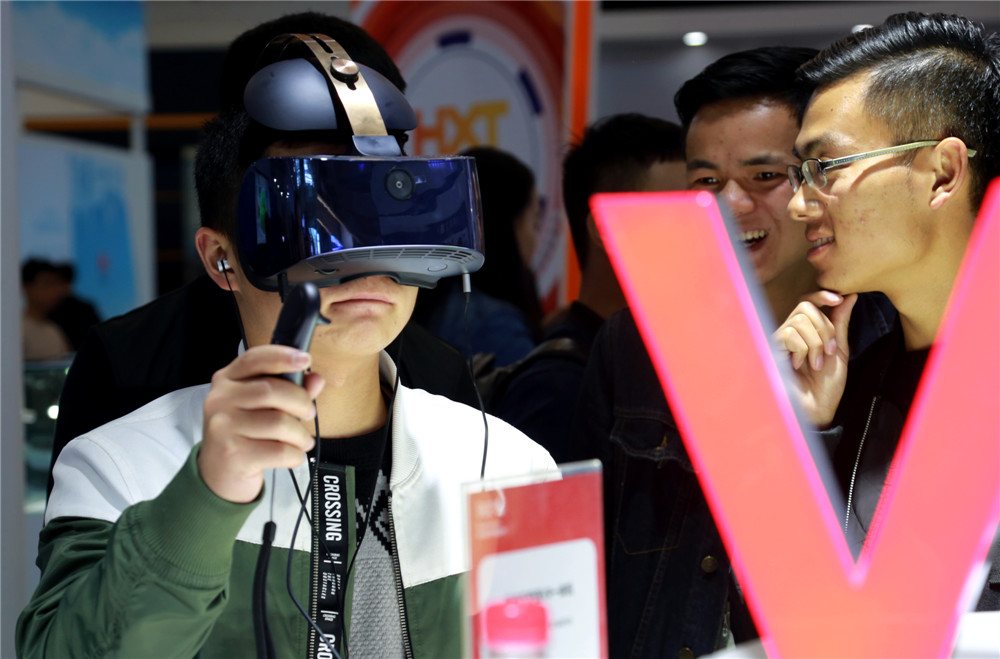Big data begins to make a big impact
China Daily,December 08, 2017 Adjust font size:
A visitor experiences virtual reality technology at the China International Big Data Expo in Guiyang, Guizhou province, in May. The expo was the first in the world to specifically use a big data theme,Photos By Yang Jun / China Daily
An industry park in Southwest China has become the nerve center of the burgeoning sector, as Yang Wanli and Yang Jun report from Guiyang, Guizhou.
Last year, after he completed a bachelor's degree in computer science in the Inner Mongolia autonomous region in the north of China, 22-year-old Song Jian made a decision that sent him in a different direction to his classmates. He headed south and landed a job in Chengdu, capital of Sichuan province.
"The city is famous for beauties, and I thought I would definitely find someone to love there," he said, with a laugh.
Song did fall in love, but not with a person. Instead, his affections were engaged by big data - a concept that is spreading nationwide but hasn't yet been put into widespread practical use - through his work in the Chengdu branch of Youedata, a tech company headquartered in Beijing.
Early this year, Song moved again, this time to the company's offices in Guiyang, capital of Guizhou province. Although he has left the bright lights behind by relocating to a third-tier city, he believes the transfer will provide a promising future.
The Guizhou government has taken the initiative to promote poverty relief through the use of big data. In the past three years, the mountainous province has been transformed into an innovation hub by the arrival of leading companies, including Apple, Alibaba and Hyundai Motors.
In the first half of the year, the money generated by data utilization in the province was 5.26 billion yuan ($794 million), a jump of 64 percent compared with the same period last year. It was first time the local sector had registered double-digit growth, according to statistics provided by the provincial government.
Guian New Area, an hour's drive from Guiyang, is a 1,795-square-kilometer industrial technology park that is home to more than 400 companies in the big data industry.
"The park concentrates the world's top enterprises in one place, which will provide more convenience for cooperation and the development of business opportunities. It also provides more possibilities for the future," Song said.
Driving force
With the support of the National Information Center, Youedata is responsible for the operation of six State-owned big data centers across the country, including one in Guiyang, and more than 100 big data companies have started operations in them.
Since its establishment in December last year, Guiyang Youedata has become a driving force in the city's big data sector, cooperating with local public sector companies to explore and use data resources. At present, the company is mainly focused on data-cleaning work.
"It's a process of desensitization; cleaning sensitive, security - and privacy-related items from the original data to produce information that can be further used for behavioral analysis or risk prediction," said Huang Xiaoyin, director of the company's integrated management office.
For example, phone companies have the names, ID numbers and phone numbers of all their customers, along with logs of their calls and text messages. Some of the information, such as consumption preferences or the frequency of phone use can be analyzed via big data to develop business strategies. However, the information must first be "desensitized" - which means all the names, ID numbers and addresses must be erased to protect customers' privacy.
According to Huang, 80 percent of the company's employees are experts in big data research and development, and they are young, mainly ages 22 to 40.
"Big data is bringing opportunities and vitality to this mountainous city, which is attracting more young talent from the province and neighboring cities seeking to further their careers," she said.
Dong Chuanye, deputy director of Guiyang Youedata, said the provincial and municipal governments have played leading roles in big data development, compared with authorities in many other cities.
In addition to special funding support, tax breaks and other policies, and free use of office space for five years, the government helps to promote business opportunities between the park's big data companies and potential customers through expos and conferences. In August, Guiyang will host the China International Big Data Industry Expo, which will be attended by several leading global businesses, including Microsoft, Intel, Dell, Oracle SAP and Tesla, he said.
The local government also provides strong support for the exchange and use of data, authorizing big data companies to access information collected by the government and other public sector bodies in the city. To date, 15,033 data dictionaries and 243 data sets from 51 sectors have been made available to authorized companies.
"This is crucial to the development of the big data industry. Data is the industry's blood. Without it, we couldn't survive, not to mention develop. In many other cities, data barriers still exist between different public sector bodies, but Guiyang has been a pioneer in breaking down those walls," Dong said.

